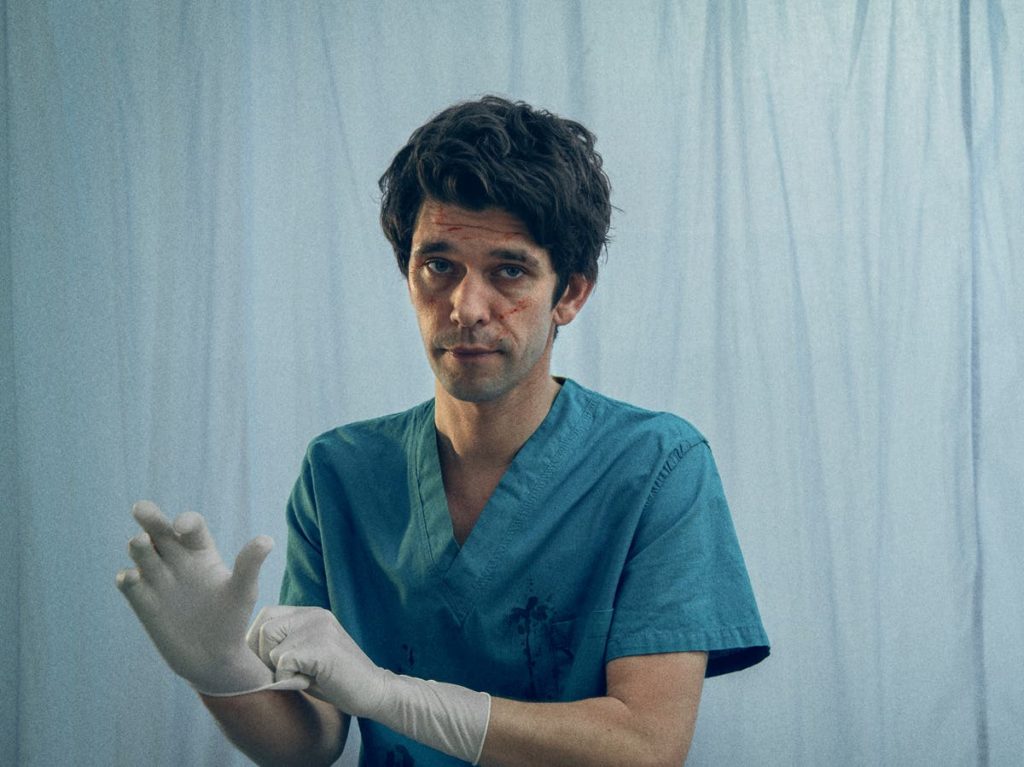Described as a ‘love letter to the NHS’, This is Going to Hurt is a comedic and gory recollection of a struggling junior medic that reminds us how underappreciated the frontline health workers are.
Based on the best-selling non-fiction memoir of the same name, the BBC drama reveals an explicit tale of a junior doctor who faced day-to-day intricacies while working in the OB/GYN ward for the National Health Service. The real-life Adam Kay had only one person in mind when the adaptation was in the process of making – Ben Whishaw. We can understand now why, as Ben captivates Adam’s nature effortlessly. From the first scene, it is evident that Kay has no control over his life whatsoever. His sleep gets interrupted when duty-call brings him to the ward. On his way to the ward, Kay finds a woman in labor. Later Kay discovers that the woman is suffering from an umbilical cord prolapse. Despite the stressful situation, Adam assures the woman in labor that with the help of his scalpel, the C-section will go just fine (which it does eventually).
Adam Kay’s life in the obstetrics and gynecology ward is demanding. He describes the overtime work, sleepless nights, and elbow-deep childbirth procedures as “constantly being splashed by the bodily fluids. Not even the fun kind.” When recounting his life as Ob/Gyn trainee, he very morbidly says- “they(trainees) end up with twice the numbers of patients they started with”. In the first scene, Adam is seen sleeping, and in the closing scene, he slumps into sleep in a club while celebrating his friend’s stag night. He is unshaven, sleep-deprived, completely disengaged, and far from navigating a healthy life. Caustic humor and excessive caffeine are his defense mechanisms. All of these imply how thankless his job really is.
On top of that, his private life is on the verge of distortion as he tries to keep his boyfriend Harry (Rory Fleck Byrne) a secret. When he cannot say things to the person upfront, Adam speaks at the camera as if he is aware that viewers are intently listening to what he is saying. His relationship with his colleagues is not full of beans either. One moment he is facing mortifying remarks by his conceited consultant, Dr. Lockhart (Alex Jennings), and the other moment, he is berating his junior trainee, Shruti (Ambika Mod). The show grapples with birth, death, adaptability, and sickness. Viewers may find some of the scenes quite discomforting because of how graphic and gory they are.
The significant feature that the adaptation retains from the memoir is the gallows humor which the workers need when they are in the frontline of the NHS. Workers in NHS in the drama can come off as cynical, but in reality, it is just their coping mechanism, if no less. Throughout the show, the character Adam Kay is as bitter as he was in the first episode. Viewers who expect a compassionate man to root for might get disappointed, but in the end, the character is perhaps not that unconventional. He is just another stressed-out doctor, performing procedure after procedure while struggling able to function. The fate of countless lives rests upon his hands even though he can barely keep his eyes open.
Another unique feature of this six-part drama is its realism. This show depicts the highs and lows of the understaffed and underfunded hospitals and the out-of-sorts life of the frontline workers.
Some days, childbirth ends up in premature babies caused by pre-eclampsia, or some days it ends up in stillbirth. One wrong judgment by the doctor may bring fatal consequences to the patient. Unlike most medical dramas, where each case is an exciting conquest and the doctors are shown as superheroes with uniforms, this series makes an upbeat approach to show the gritty parts of healthcare systems.
The medical drama went to great lengths to depict how little gratitude the NHS jobs have for their workers. The cry of crisis blends seamlessly with the dry humor of the medics, especially Adam Kay’s. Ben Whishaw is splendid in his portrayal as a tired and scrawny registrar who only wants to turn off his emergency alarm and get some sleep. The story caters to medical accuracy and takes a pragmatic approach to what medical practitioners go through daily, emotionally and mentally. Overall, the seven-part series is a profound and unflinchingly honest insight into the critical issues of NHS workers.
